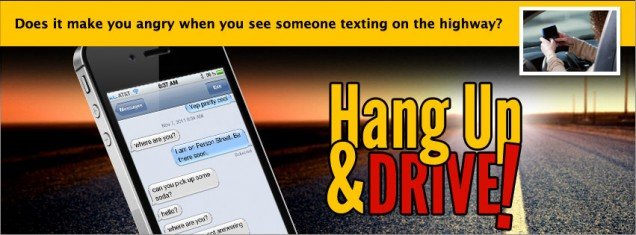

Stop Distracted Driving! Our Facebook ‘Hang Up and Drive!’ Campaign

Speeding and drunk driving causes accidents, injuries and deaths. That’s why Florida and states across the country have laws that encourage people to avoid these forms of reckless driving and punishes those who do. Why should distracted driving be treated any differently?
At Philip DeBerard, Injury Attorney, we understand how distracted driving can have tragic consequences. However, we don’t understand why people continue to choose to drive while distracted or why Florida is one of the few states with no laws that address this threat.
As passionate advocates for public safety, we are dedicated to stopping distracted driving. In fact, we have sponsored a Facebook campaign, “Hang Up and Drive!,” that is aimed at raising awareness of the dangers of distracted driving. We hope it will encourage Florida drivers and lawmakers to make the right decisions. We hope our campaign will ultimately save lives.
Why Do We Care About Distracted Driving?
As a personal injury lawyer who has helped car accident victims and their families throughout South Florida and the Treasure Coast, attorney Philip DeBerard has seen firsthand how individuals’ reckless decisions can devastate the lives of others. That’s why he is dedicated to stopping distracted driving. Our firm’s hope: If people understood why distracted driving is dangerous and how it can harm others, they would make the responsible choice and avoid it.
It’s in the Numbers: Distracted Driving is Dangerous
Distracted driving is a generic term for any number of different activities. Basically, the term applies to any activity that takes one’s attention away from safely operating a vehicle. So, in that sense, distracted driving could include:
- Eating or drinking food
- Grooming (such as combing your hair, applying makeup or looking in a mirror)
- Talking to other passengers in the car
- Reading directions or a map
- Adjusting devices such as a radio or GPS unit.
As the Florida Department of Highway Safety and Motor Vehicles’ most recent statistics show, any type of driver distraction can be dangerous. In 2010, “driver distraction” caused 1,474 injuries and seven deaths in the state, the department says.
But the distracted driving activities we are most concerned about are talking on a cell phone and texting while behind the wheel. Why? These activities involve all three types of distraction – visual, manual and cognitive – and are clearly the most dangerous.
Here are some other facts and figures from the National Highway Traffic Safety Administration (NHTSA) that reinforce our concern:
- When you send or receive a text message, it takes your eyes off the road for an average of 4.6 seconds. If you’re traveling at 55 mph, that would be the same as driving the length of a football field without looking at where you’re driving.
- Drivers who use hand-held cell phone devices are four more times likely to get into crashes serious enough to injure themselves, according to a Monash University study.
- Texting while driving creates a crash risk 23 times worse than driving while not distracted, according to the Virginia Tech Transportation Institute.
- Teens – our sons and daughters – may be the most likely to be involved in a distracted driving accident caused by cell phone use or texting. In one survey, 40 percent of teen drivers said they had been in a car in which the driver used a cell phone (or smartphone) in a dangerous way.
According to a recent USA Today article, we can now add “webbing while driving” as a public safety threat. The newspaper reported that, among drivers ages 18 to 29, surfing the Web on a smartphone while behind the wheel increased from 29% in 2009 to 48% in 2012.
What is Florida Doing to Stop Distracted Driving?
Unfortunately, even though 70 percent of Florida voters would support a ban on texting while driving, according to the Tampa Times, our lawmakers have not passed any ban on texting while driving or enacted legislation that would prohibit distracted driving. In fact, Florida’s Preemption Law prohibits localities from enacting any distracted driving bans!
There have been several efforts to pass anti-texting-while-driving legislation in recent years that have not been successful.
According to the Orlando Sentinel, Gov. Rick Scott ordered a texting-while-driving study in October 2012 after figures were released showing a 4 percent spike in Florida traffic accidents. Also, several groups recently held the first Florida Distracted Driving Summit, featuring U.S. Secretary of Transportation Ray LaHood as the keynote speaker.
Hopefully, these developments will generate momentum toward finally getting a Florida law on the books that stops people from distracted driving.
What Can You Do? Use Our Distracted Driving Pledge
In addition to the Hang Up and Drive! campaign that our firm has sponsored, Philip DeBerard, Injury Attorney, also has provided a “Distracted Driving Policy” for Florida employers to use in stopping distracted driving by their employees.
Under the policy, employees would pledge to not use a cell phone for talking or texting while operating a motor vehicle, whether it is moving or stopped in traffic. Employees can sign the pledge, and it can be filed with the company’s human resources department.
Learn More about Distracted Driving
You can also learn more about distracted driving by turning to these helpful sources:
- Hang Up and Drive! – Check out our firm-sponsored Facebook campaign for the latest updates on this issue.
- National Highway Traffic Safety Administration – The NHTSA’s distraction.gov site contains a wealth of information about federal efforts to curb distracted driving as well as links to facts and statistics and distracted driving research.
- Governors Highway Safety Association – See what our country’s governors are doing to address this issue.
- National Organization for Youth Safety – Check out the efforts to stop texting while driving and other distracted driving activities among teens by one of the country’s largest teen safety organizations.
- U.S. Centers for Disease Control and Prevention – The CDC’s distracted driving page contains update statistics and analyses of the problem of distracted driving.
- National Safety Council – See what’s being done by the NSC to stop distracted driving, including its work during April’s Distracted Driving Awareness Month and its own pledge to drive cell phone free.
- Florida House and Florida Senate – Check on legislative efforts to ban texting while driving or contact your local lawmaker to let them know that you support distracted driving legislation.
Injured?
Request A Free Case Evaluation



